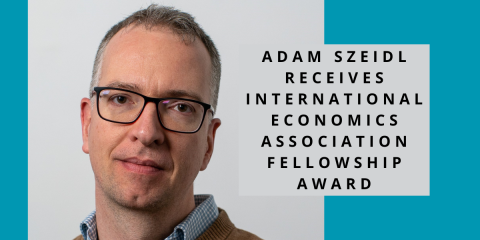
The International Economics Association (IEA) has granted Adam Szeidl, Professor in CEU’s Department of Economics and Business with the IEA Fellowship Award. This annual fellowship is awarded to 10 economists worldwide for important contributions through the creation or dissemination of new ideas and high-quality policy work.
Szeidl’s timely contribution to the understanding of political economy includes recent research on “The Political Economy of Alternative Realities” (co-authored by Ferenc Szucs), which shows how populist politicians can successfully persuade voters by promoting alternative realities and discrediting intellectual elites. In 2021 he published an influential paper on “Media Capture through Favor Exchange” (also with Szucs) in one of the top journals in economics, Econometrica, showing how targeted government advertising can be used to influence media content.
“The International Economic Association, with its focus on research cooperation between economists across the globe, including in developing countries, is an institution I hold in high regard. It is especially pleasing to receive the award together with other researchers whose work I greatly admire,” said Szeidl, who additionally received CEU’s Research Excellence Award in June 2023.
Szieidl has recently served as Joint Managing Editor of the Review of Economic Studies, a leading journal in economics, and was a recipient of both a European Research Council (ERC) Starting Grant and an ERC Consolidator Grant. Prior to joining CEU in 2011, Szeidl was Associate Professor of Economics at UC-Berkeley. He received his PhD in Economics from Harvard University in 2004, and his MA in Economics from CEU in 2000.
“I am excited about my research agenda which explores the power of ideas in political economics. We see persistent misbeliefs about many aspects of life from climate change to Covid, and these misbeliefs often combine into semi-coherent alternative realities featuring conspiracy theories,” said Szeidl. “I believe that understanding the internal logic of these alternative realities is important for understanding when such misbeliefs might emerge, how they affect political and economic life, and what benevolent policymakers may do to help correct beliefs.”
To select the 10 fellows, the IEA’s nominating committee seeks nominees from around the world to create a list of candidates who will be put up for a vote. Voting is then cast by all of IEA’s Schumpeter-Haberler Distinguished Fellows and IEA Fellows based on the candidates’ excellence in research publications and in research-driven contributions to popular writing, economics curriculum and policy work.
The other recipients of the 2023 IEA Fellowship Award are:
Danny Quah, NUS
Marc Melitz, Harvard University
Sam Bowles, Santa Fe Institute
Ekaterina Zhuravskaya, Paris School of Economics
Vera Songwe, UN Africa
Gordon Hanson, Harvard University
Sascha Becker, Monash University
Indermit Singh Gill, World Bank
Miaojie Yu, Liaoning University